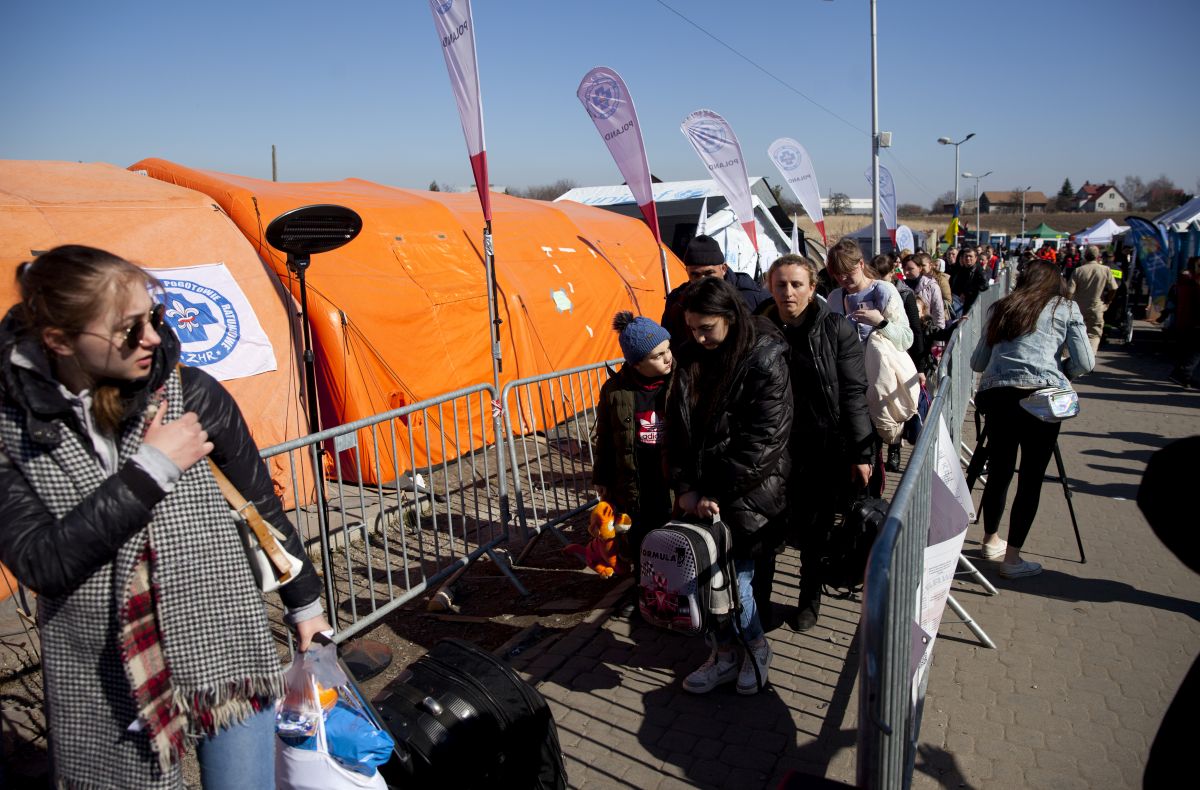Involvement of EU Agencies in Helping Countries That Are Receiving Refugees from Ukraine
EU support for Member States most affected by the war in Ukraine includes funding for reception measures and ensuring refugees have access to protection throughout the Community, as well as coordination and operational assistance from EU agencies. The offer of agency resources extends to humanitarian aid, border management, and capacity-building of the Member States. Exploring the full potential of the EU agencies will require overcoming their internal problems and the will of the Member States to involve them in such cooperation.
 Arkadiusz Lawrywianiec/ Forum
Arkadiusz Lawrywianiec/ Forum
In response to the EU Council’s call on 7 March, the Justice and Home Affairs agencies issued a joint declaration of their readiness to engage in reducing the negative effects of the war in Ukraine on neighbouring countries. On 28 March, the Justice and Home Affairs Council adopted a 10-point plan to coordinate efforts to accommodate people fleeing Ukraine. The plan recognises the key role of three EU agencies—the European Union Agency for Asylum (EUAA, formerly the European Asylum Support Office, or EASO), the European Border Guard Agency–Frontex, and the European Union Agency for Law Enforcement Cooperation (Europol)—in supporting Member States affected by the war. Specific tasks are also entrusted to the European Union Agency for the Operational Management of Large-Scale IT Systems in the Area of Freedom, Security and Justice (eu-LISA).
Information Exchange and Coordination
On 8 March, the European Commission (EC) proposed a “Solidarity Platform” through which Member States can exchange information about their capacity to receive refugees, the number of people granted temporary protection on their territory, and other needs of additional support (e.g., accommodations or transfers). The Commission, together with the European Union Agency for Asylum, is to coordinate the necessary operational response, including the deployment of persons to Member States and third countries. According to the plan adopted by the Council, eu-LISA is responsible for setting up a platform to facilitate the protection of refugees, especially unaccompanied minors, and their movement within the EU. It will also allow the development of a Europe-wide index to track the dynamics of inflows and provide an immediate response to places prone to high migration pressure at both the national and European levels. The EUAA will support the Commission in developing operational procedures and uniform guidelines for the admission of children, including the reception and transfer of unaccompanied minors.
Europol provides situational support to Member States receiving refugees, including security threats , such as the risk of foreign fighters appearing in the EU. Using the Europol-coordinated European multidisciplinary platform against crime threats (EMPACT), Member States and EU agencies are to share information that will help prevent criminals from taking advantage of the crisis. The aim of the cooperation within the network is, in particular, to detect trafficking in human beings and weapons, internet fraud, or misappropriation of funds allocated to aid for refugees.
On-site Operational Support
Frontex’s operational support covers both border control assistance and the organisation of humanitarian return, enabling non-Ukrainian and EU citizens fleeing the war in Ukraine to reach their home countries. As part of its cooperation with third countries, the agency conducts an operation in Moldova where officers of the Frontex standing corps (border guards and document experts) assist with border control and the admission of refugees. Member States Romania, Slovakia, and Estonia have also asked the agency for support in the form of the presence of a permanent corps and border control equipment. Poland, which has not requested the deployment of a permanent corps on its territory, uses other forms of agency support—so far, in cooperation with Frontex, four humanitarian return flights have been organised, as a result of which 697 people have been sent back from Poland to their countries of origin.
Following the entry into force of the Council Decision on the application of the 2001 Temporary Protection Directive, the European Asylum Agency is reviewing plans for operations in some Member States (Belgium, Cyprus, Greece, Italy, Latvia, Lithuania, Malta, Spain). Additionally, in connection with the refugee crisis on the eastern border, on 28 March, it launched a support operation in Romania. The plan of operations foresees the gradual deployment of up to 120 EUAA staff and interpreters in the country to support the asylum services, which are facing a large influx of newcomers. Czechia also asked for support from the agency in the form of an operation.
Taking into account the need to protect refugees and the security of the EU as a whole, at the request of the countries concerned, Europol has already deployed operational teams composed of agency specialists and guest officers in Lithuania, Poland, Romania, Slovakia, and Moldova. It also plans to deploy a team to Hungary. The tasks of the teams focus on supporting the national authorities in carrying out secondary security checks and border investigations to identify criminals and terrorists trying to enter the EU during the crisis. Officers also collect information that is used to develop EU crime risk assessments.
In addition, in April, Europol, together with Frontex and the EU Agency for Criminal Justice Cooperation (Eurojust), launched Operation Oscar, the purpose of which is to support investigations carried out by Member State authorities into the assets of Russian oligarchs and companies subject to sanctions in connection with Russia’s invasion of Ukraine. The agency’s operational support is to facilitate the detection and possible confiscation of these assets, which potentially also can be used for the reconstruction of Ukraine in the future.
Challenges
Developing the agencies’ activities in the current crisis will require an increase in their funding, as their work programme and budgets for this year were already set and therefore do not take into account the increased need for support on the EU’s eastern border. This can be clearly seen in the example of the EUAA, which is still conducting many support operations in the countries of Southern Europe. The agency Frontex, which is key to managing the situation at the EU’s borders, has a large budget, but suffers from internal problems that are the subject of investigations by, among others, the European Anti-Fraud Office and the European Ombudsman. Out of concern about these investigations, at the beginning of the year, the European Parliament froze part of the agency’s budget for 2022 (out of €757.79 million allocated, €90 million has been held in reserve). The allegations of a lack of transparency in its activities, inappropriate financial and recruitment procedures, as well as improper solutions enabling the monitoring of fundamental rights undermine the trust in Frontex by other EU institutions and the Member States. These problems limit the agency’s operational ability.
Conclusions
The Justice and Home Affairs agencies, notably Frontex, the European Union Agency for Asylum, and Europol, have important roles to play in the current refugee crisis. With them, the ad hoc aid to frontline states can be better coordinated and structured, and therefore more effective. Both the EU institutions and the Member States concerned are starting to recognise the opportunities that come with the involvement of the agencies in joint activities. Nevertheless, the potential of these institutions is still not fully used.
Overcoming the internal problems of some of the agencies and adapting their work programmes to the new migration challenges are prerequisites for developing sufficient cooperation to counter the negative effects of the refugee crisis. In view of the projected increase in the number of refugees on the eastern border caused by the escalation of fighting in eastern Ukraine, the need to resolve these problems has become urgent. As the scale of the needs of the countries most affected by the crisis grows, so too will the need to involve the agencies in cooperation. The more so as the countries neighbouring Ukraine that already have received the most refugees since the war started have little experience and systemic limitations in managing migration.


